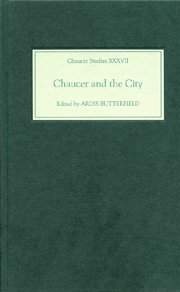Book contents
- Frontmatter
- Contents
- List of Illustrations
- Dedication
- Preface
- List of Contributors
- Abbreviations
- Map
- INTRODUCTION
- LOCATIONS
- COMMUNITIES
- INSTITUTIONS
- 8 Literary Contests and London Records in the Canterbury Tales
- 9 The Great Household in the City: The Shipman's Tale
- 10 London and Money: Chaucer's Complaint to his Purse
- AFTERLIVES
- Bibliography
- Index
- CHAUCER STUDIES
9 - The Great Household in the City: The Shipman's Tale
from INSTITUTIONS
Published online by Cambridge University Press: 05 February 2013
- Frontmatter
- Contents
- List of Illustrations
- Dedication
- Preface
- List of Contributors
- Abbreviations
- Map
- INTRODUCTION
- LOCATIONS
- COMMUNITIES
- INSTITUTIONS
- 8 Literary Contests and London Records in the Canterbury Tales
- 9 The Great Household in the City: The Shipman's Tale
- 10 London and Money: Chaucer's Complaint to his Purse
- AFTERLIVES
- Bibliography
- Index
- CHAUCER STUDIES
Summary
Medieval cities are unreceptive of any simple economic or institutional explanation. Cities or towns were not singular mercantile, capitalist cells evolving in isolation from a primitive feudal countryside. Towns and countryside were interdependent and pervasively implicated in each other's development. Yet to say that complex explanations are called for is not to abandon the city as formless or impossible for medieval writers to imagine (or simplify). Mercantile ideas of the city and class identity were formed in the midst of the diversity which has been identified as the fundamental characteristic of medieval urban society. Cities and towns, by this definition, were places which supported not a single main occupation, such as agriculture or tin mining, but multiple industrial and trade occupations. The merchant is a convenient symbol of the city not because the urban was coextensive with the mercantile but because merchants were only to be found in urban places and because the larger and more intensively urban a town became, the more likely it was to be economically and politically dominated by merchants. English merchant elites constructed their own powerful and merchant-centred idea of the city through their control of civic government, regulating labour, access to markets and rights of citizenship, and through proclamations, records and civic ceremony which valorised ‘prudence’ and the ‘more sufficient’ members of the urban community. Merchant elites could sustain their idea of the city partly because, as Christopher Dyer states, ‘without their management of the higher levels of the trading system, the larger towns in which they were based could not have existed’.
- Type
- Chapter
- Information
- Chaucer and the City , pp. 145 - 161Publisher: Boydell & BrewerPrint publication year: 2006

